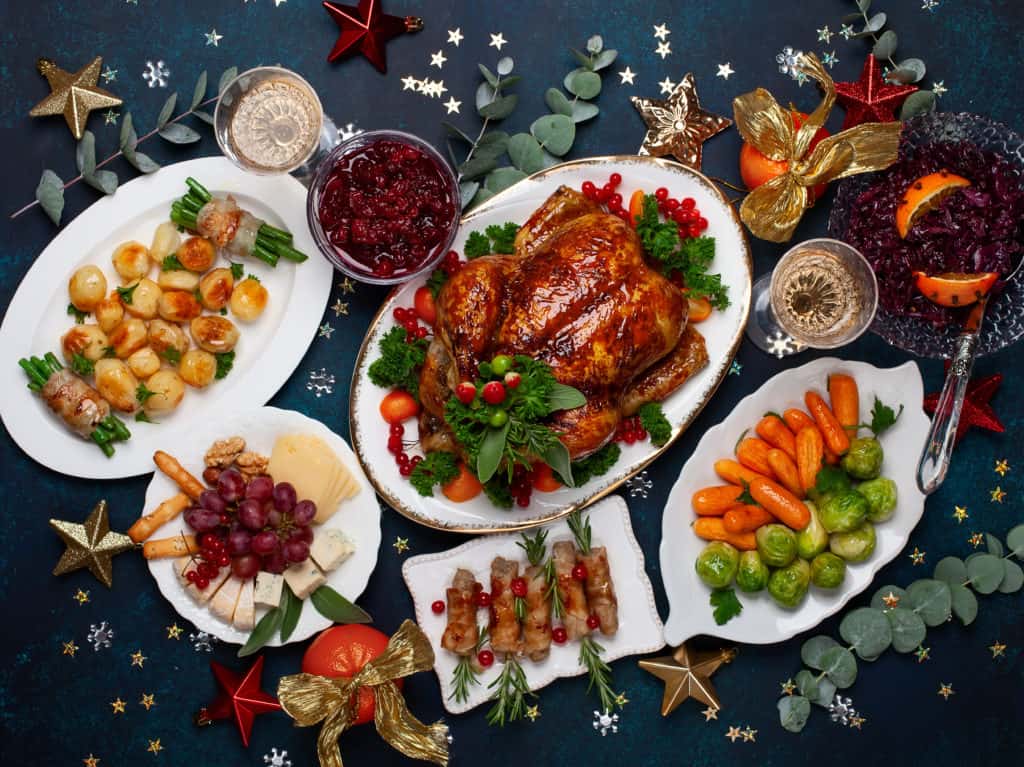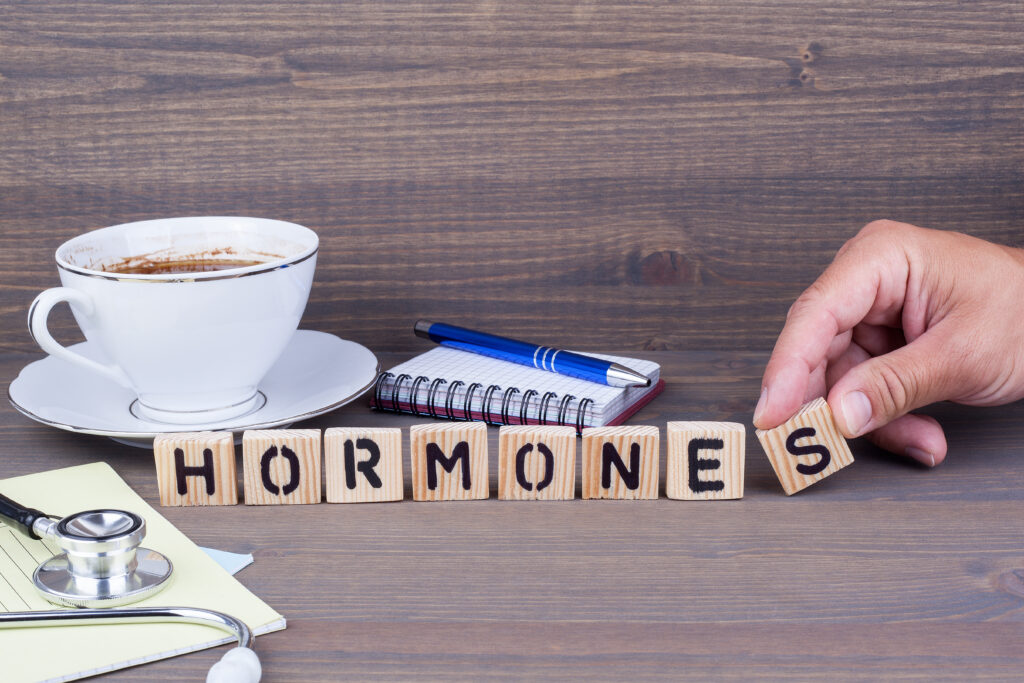With 2021 winding down to a close, we are once again looking forward to spending this time with our family and friends. Of course, we are also faced with the excitement of our festive tables – the mince pies, Yorkshire puddings, turkey, and the festive bubbly drinks!
After the past two years that we’ve had globally, thoroughly indulging in all the festive goodness feels more than deserved. However, COVID is still a looming threat therefore it is still highly important to keep healthy and reduce risk as much as possible without diminishing the fun of this jolly season.
Here are some key things that you can do to celebrate Christmas without the poor aftereffects.
Keep an eye on portions
In the United Kingdom, the average person will put on 4-6lbs of weight between Christmas and New Year (Mortimore, 2017). Further, people who have a higher body mass index (BMI) will gain more weight than people who have a normal BMI (Roberts and Mayer, 2000, Hull et al., 2006). This is also true for kids (Branscum et al., 2010) and not al all surprising with the increased consumption of desserts, sweets, and other carb-loaded foods.
Increased calorific intake is dangerous and can lead to various health debilitating issues like obesity and diseases or illnesses like diabetes, coronary heart disease, hypertension and stroke. According to Calle and Thun (2004), obesity is also linked to colon cancer, renal cell cancer, breast cancer and oesophageal cancer.
Despite these criticisms, you don’t have to stop enjoying the treats that will be available. Eat plenty of vegetables and fruit among all the chocolates, mince pies and roast potatoes to keep a balanced diet and you will have a much happier time during the celebrations.
Reduce alcohol consumption
During the festive season, alcohol consumption rises steeply. A typical/special occasion drinking like Christmas or New Year’s added more than 120 million UK units of alcohol per week (with the highest portion falling among those aged 25-34) (Bellis et al., 2015).
Alcohol abuse has been linked to increased accidents (Gapper, 2006), the holiday heart syndrome (HHS) wherein people with no prior cardiac issues quickly develop heart disease due to increased alcohol consumption (Budzikowski, 2012) and also increase in heart failure doctor visits after Christmas and New Year’s day (Reedman et al., 2008).
This study by Barclay et al., (2008) explains the well documented adverse physical effects of alcohol – everything from poor coordination to liver issues, cardiovascular, effects on skin and more.
If you’re going to be enjoying some drinks this season, consider reducing the impact on your health by eating before drinking and intermittently having a non-alcoholic drink to prevent overindulgence.
Do some dancing
No one can deny the benefits of exercise whether it be cardio or weights at any point of the year. This also extends to Christmas. Allowing yourself to have an active break between eating will help reduce the effects of eating so much food.
A run, brisk walk or even dancing around your home with your family is sure to get your heart rate up and burn up even a small portion of the calories you consume. According to the CDC, adults, aged 18-65+ should do at least 150 minutes of moderate-intensity activity per week and muscle-strengthening activities twice per week. Those who are 65+ should also add balancing activities to that list (CDC, 2021).
If you can do even the smallest amount during the festive period it will help reduce the effects of too much food or alcohol.
Sleep
Christmas and New Year celebrations are usually marked by long parties. It’s, of course, very fun however staying up into the early morning of the next day is far from healthy. Research has found that insufficient sleep is linked with increased poor dietary habits and obesity (Chaput, 2014).
This is because when people lack sleep, they lack energy. To compensate for this people, tend to overindulge in fatty or sugary foods and we already know the effect of those!
Stay safe if travelling around
COVID still has a hold over the world. Learning from last year will help everyone stay safe and prevent the NHS from going over capacity (McLellan and Godlee, 2020). Many are still vulnerable and with the introduction of new variants, it might be a new challenge to keep people safe (WHO, 2021).
Follow the government guidelines and if appropriate get vaccinated. For more information about COVID and why vaccines are important read our previous blog.
Check-in with your doctor
The year may be winding down to a close and you may be thinking ‘I’ll visit the doctor next year what’s the worst that can happen’. And you may be right in thinking that however if you can get yourself a check-up now, why wait until later?
Knowing that your health is in top shape will only give you peace of mind and you will be able to celebrate Christmas and New Year’s with your friends and family knowing that this year is ending on a good note, and the next year is beginning on an even better one.
Knowing you’re healthy with Echelon Health
If you wish to get a health check and greet the New Year with the knowledge that your health is the best it can be don’t hesitate to contact the team at Echelon Health.
We are the world-leading providers of private and corporate health assessment programmes. Using the most advanced medical imaging technology in combination with years of medical knowledge and experience we are able to detect abnormalities as small as 2mm. Further, with the technology at our disposal (MRI, CT, X-Ray and Ultrasound scanners) we are able to detect up to 92% and 94% of preventable diseases among men and women. Give yourself the ultimate gift this year – peace of mind about your health!
We have several packages that we can offer based on your area of concern – all of which can be discussed with our team who will help you find the best option. If you are interested to hear more information don’t hesitate to contact us here or download our brochure.
Sources:
Mortimore, G. (2017). Christmas health warnings go down like a sack of coal.
Roberts, S. B., Mayer J. (2000). Holiday weight gain: fact or fiction?. Nutrition reviews, 58(12), 378-379.
Hull, H. R., Radley, D., Dinger, M. K., & Fields, D. A. (2006). The effect of the Thanksgiving holiday on weight gain. Nutrition journal, 5(1), 1-6.
Branscum, P., Kaye, G., Succop, P., & Sharma, M. (2010). An evaluation of holiday weight gain among elementary-aged children. Journal of Clinical Medicine Research, 2(4), 167.
Calle, E. E., & Thun, M. J. (2004). Obesity and cancer. Oncogene, 23(38), 6365-6378.
Bellis, M. A., Hughes, K., Jones, L., Morleo, M., Nicholls, J., McCoy, E., … & Sumnall, H. (2015). Holidays, celebrations, and commiserations: measuring drinking during feasting and fasting to improve national and individual estimates of alcohol consumption. BMC medicine, 13(1), 1-12.
Gapper, S. (2006). Pub medic-Warning: Christmas can seriously damage your health. BMJ, 332(Suppl S1).
Barclay, G. A., Barbour, J., Stewart, S., Day, C. P., & Gilvarry, E. (2008). Adverse physical effects of alcohol misuse. Advances in Psychiatric Treatment, 14(2), 139-151.
Budzikowski A. (2012). Holiday heart syndrome—background. Available at: http://emedicine.medscape.com/article/155050-overview. Accessed: 29/11/2021.
Reedman, L. A., Allegra, J. R., & Cochrane, D. G. (2008). Increases in heart failure visits after Christmas and New Year’s Day. Congestive Heart Failure, 14(6), 307-309.
CDC (2021). Physical Activity for Different Groups. Available at: https://www.cdc.gov/physicalactivity/basics/age-chart.html Accessed 29/11/2021.
Chaput, J. P. (2014). Sleep patterns, diet quality and energy balance. Physiology & behavior, 134, 86-91.
McLellan, A., & Godlee, F. (2020). Covid 19: Christmas relaxation will overwhelm services.
WHO (2021). Tracking SARS-CoV-2 variants. Available at: https://www.who.int/en/activities/tracking-SARS-CoV-2-variants/ Accessed 29/11/2021.



